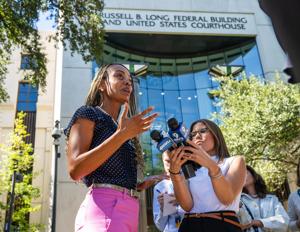
Alanah Odoms, the executive director of ACLU Louisiana, answers questions outside of the Russell B. Long Federal Building and United States Courthouse after the morning session of a hearing challenging the state’s Ten Commandments Law on Monday, October 21, 2024 in Baton Rouge, Louisiana. STAFF PHOTO BY MICHAEL JOHNSON Alanah Odoms, the executive director of ACLU Louisiana, answers questions outside of the Russell B.
Long Federal Building and United States Courthouse after the morning session of a hearing challenging the state’s Ten Commandments Law on Monday, October 21, 2024 in Baton Rouge, Louisiana. STAFF PHOTO BY MICHAEL JOHNSON Alanah Odoms, the executive director of ACLU Louisiana, answers questions outside of the Russell B. Long Federal Building and United States Courthouse after the morning session of a hearing challenging the state’s Ten Commandments Law on Monday, October 21, 2024 in Baton Rouge, Louisiana.
STAFF PHOTO BY MICHAEL JOHNSON Russell B. Long Federal Building and United States Courthouse was the site for a court hearing challenging the state’s Ten Commandments Law on Monday, October 21, 2024 in Baton Rouge, Louisiana. STAFF PHOTO BY MICHAEL JOHNSON Rev.
Darcy Roake, second from left, is one of the Louisiana parents who filed a lawsuit to block schools from posting the Ten Commandments. She spoke to reporters after Monday's hearing along with attorneys for the plaintiffs. By PATRICK WALL | Staff writer Louisiana Attorney General Liz Murrill spoke with reporters Monday after a federal court hearing where her office defended a new law requiring public schools to post the Ten Commandments.
By PATRICK WALL | Staff writer Facebook Twitter WhatsApp SMS Email Print Copy article link Save Louisiana public schools will soon learn whether they must comply with a new law requiring them to post the Ten Commandments in every classroom after a federal judge said Monday he would issue a ruling on the contested law by Nov. 15. Lawyers for parents who sued to block the law from taking effect argued in U.
S. District Court on Monday that the law violates students' religious freedom and would cause irreparable harm if schools put up the posters by Jan. 1, as required by the new law.
Attorneys for the state countered that the legal challenge was premature because schools have not yet posted the commandments, which they argued could be presented in ways that wouldn't run afoul of the U.S. Constitution.
The five parishes where the plaintiffs’ children attend school — East Baton Rouge, Livingston, Orleans, St. Tammany and Vernon — previously agreed to wait until after Nov. 15 to post up the signs.
On Monday, Judge John deGravelles said he would issue a ruling no later than that date on plaintiffs' motion to block the law. "The ball is now officially in my court," deGravelles said after nearly six hours of arguments in his Baton Rouge courtroom Monday. Under Louisiana’s new law, Act 676, public K-12 schools and colleges must exhibit the Ten Commandments in every classroom on posters measuring at least 11 by 14 inches in “large, easily readable font.
” The law dictates the wording that must be displayed, including "Thou shalt have no other gods before me,” and requires schools to post an accompanying statement explaining that some early American textbooks featured the Ten Commandments. Just days after Gov. Jeff Landry signed the law in June, a group of parents of different faiths filed a lawsuit in federal court to stop the law from taking effect.
The nine families, who are represented by several civil liberties groups, argue that the law unconstitutionally imposes religious beliefs on their children and usurps the parents’ authority to direct their children's religious education. In a motion to dismiss the lawsuit and at Monday's hearing, the state's attorneys said the court could not rule on the constitutionality of "imaginary displays" that have not yet gone up in schools. "We think it's premature," Louisiana Attorney General Liz Murrill told reporters after Monday's hearing.
"What the posters say, where they are posted, when they are posted — all of that matters for legal purposes." But the plaintiffs' attorneys said that if public schools are allowed to display the version of the Ten Commandments dictated by the law, it would put parents who don't want their children exposed to the biblical text in school in an "impossible situation." Parents would have to decide whether to send their children to schools with the displays or keep that at home in violation of the state's truancy laws.
"It would be incredibly difficult," said Rev. Darcy Roake, a plaintiff who is an ordained minister in the Unitarian Universalist Church and the parent of a child who attends a New Orleans charter school. "There would be some decisions that not only myself but other parents in the public school system would have to make," Roake told reporters.
At issue in the case is whether the law violates the First Amendment, which forbids the government from "establishing" a state religion and protects citizens’ right to freely practice their chosen religion. In a 1980 case called Stone v. Graham, the Supreme Court ruled that a Kentucky law requiring schools to post the Ten Commandments ran afoul of the First Amendment because its purpose was “plainly religious in nature.
” However, that ruling relied on a standard that the court scrapped in a 2022 case called Kennedy v. Bremerton School District, which upheld a high school football coach’s right to pray on the field. In its Kennedy decision, the court adopted a new First Amendment test: Is the law consistent with the country’s history and traditions? As a result, much of Monday's hearing centered on a report produced for the plaintiffs that delves into the history of the Ten Commandments in American public education, law and government.
The report concludes that there is no tradition of public schools displaying the commandments, and no evidence that the nation's founders were heavily influenced by the commandments. "It's more or less a misnomer that the Ten Commandments underlie American law," the report's author, Steven Green, testified in court Monday. Attorneys for the state have asked the judge to exclude the report as evidence in the case, which they argue is unreliable.
On Monday, they sought to discredit Green, who is a professor of law and religious studies at Willamette University in Oregon. The defense argued that Green is biased because he previously worked for Americans United for Separation of Church and State, one of the groups representing the plaintiffs. They also challenged his methodology and conclusions, including that the Ten Commandments did not play a prominent role in American education in the past.
"It is entirely subjective," one of the state attorneys said Monday. Judge deGravelles, who was appointed by former President Barack Obama, appeared unswayed by that argument. "Tell me one historian who doesn't do that," he said.
The plaintiffs, all of whom have children in Louisiana public schools, identify as Jewish, Christian, Unitarian Universalist and non-religious. They are represented by the American Civil Liberties Union, the ACLU of Louisiana, Americans United for Separation of Church and State and the Freedom from Religion Foundation. The law firm Simpson Thacher & Bartlett LLP is serving as pro bono counsel.
The complaint names as defendants state Superintendent of Education Cade Brumley, members of the state board of education and the districts where the plaintiffs' children attend school..














